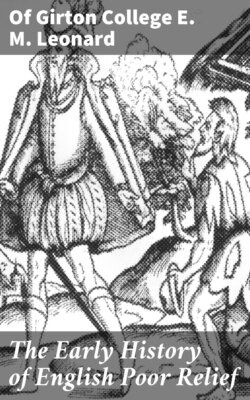Читать книгу The Early History of English Poor Relief - of Girton College E. M. Leonard - Страница 13
На сайте Литреса книга снята с продажи.
Оглавление8. The influence of the Privy Council upon the Corporation of London.
But sometimes the measures of the Privy Council were not general: pressure was placed only on particular local officials. We will first examine a few cases of this kind concerning the City of London. We have already seen that in 1569 there were two sharp letters of the Privy Council to the Lord Mayor censuring him for his neglect in matters concerning the vagrants and poor[196]. In 1573 the Lord Mayor refers again to the displeasure of the Council and had apparently received a similar letter[197]. In this way therefore the Privy Council censured neglect and commanded local officials to remedy the abuses of their administration.
Sometimes we see the authorities of London asking the advice of the Council with regard to the measures that they have themselves prepared. Orders for the poor were drawn up in 1579 and again in 1594, and in both cases the Lords of the Privy Council were consulted[198]. The Lords of the Council also call attention to particular difficulties. In 1583 they recommend special measures to prevent the increase of Irish beggars[199], and they repeatedly write to order increased vigilance in enforcing the regulations against small houses and tenements which have been newly erected[200]. Special matters are sometimes arranged by them; in 1594 the City rulers are told to meet the justices of Middlesex in order that they may take joint action to repress vagrants[201]. Even details come under the notice of the members of the Privy Council, and in 1596 they directed the Lord Mayor to see that the corn in a particular ship was sold to the poor and not bought up by dealers[202].
The Council thus was apparently very well informed as to the condition of affairs and had power to interfere with effect even in matters of detail whenever the rulers of London were inclined to be slothful.
9. The pressure exercised by the Privy Council on other local authorities.
We have not the same detailed information with regard to other towns, but we can see that this kind of action on the part of the Lords of the Council was by no means confined to London. We find them writing to Burghley himself and insisting on the appointment of Provost Marshals in Hertfordshire and Essex who were to take especial care to repress vagrants and idle persons[203]; they rebuke the Devonshire justices for not providing properly for old soldiers and sailors[204]. They write to Cambridge and order that care be taken to prevent the increase in the number of tenements in the town[205], and they especially commend the Norfolk justices for erecting a "fourme for the punishment of loyterers, stubborne servantes, and the settinge of vagabondes, roages and other idle people to work, after the manner of Bridewell[206]".
There is enough to show that the Privy Council was often active and that its interference had a considerable effect, but that before 1597 this interference was only occasionally exercised.
This pressure exerted by the Privy Council on justices and municipal authorities becomes the most important factor in the development of the English system of poor relief in the next century. Law was not yet enforced merely because it had been enacted, and in regard to the poor no force of continued habit as yet made public opinion compel negligent officials to do their duty. So far men objected to pay rates; they were not firmly convinced of the duty of the state to relieve the poor.
The pressure of the Privy Council was therefore necessary to enforce the law. But the habit of interference in these matters and the organisation that alone could make interference have much effect grew very slowly. Before 1597 we can see this habit of interference and this organisation growing, but as yet it is only utilised occasionally and to meet some special emergency; it is not part of a general system which almost everywhere commanded obedience.
